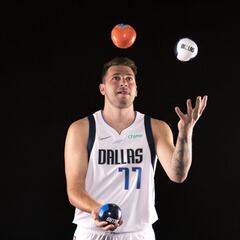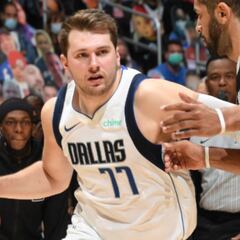Luka Doncic breaking the physical stereotypes of a professional basketball player
Anze Macek, Luka Doncic’s personal trainer this demanding summer, spoke to AS about the Slovenian guard’s physique, training methods, and how he prepares.
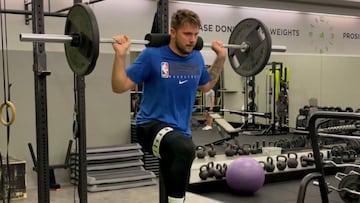

Luka Doncic, despite being only 22 years old, is undoubtedly a basketball genius. His very constitution, however, defies the norm of today’s basketball stars. He is a point guard with the body of a forward. At 6 feet 7 inches (2.01 m) and 230 pounds (104.3 kg), Doncic is a complete player who stands out neither for his speed nor for his explosiveness, but rather just the opposite. Corpulent, and without the statuesque muscular definition that is dominant in the NBA, talk of his weight has been recurrent over the last year, as fans and analysts alike have marveled at how he seems to defy the laws of physics and turns what should be deficiencies into virtues.
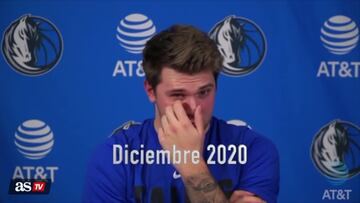
Last season, his third in the NBA, he played 2,262 minutes. Only 14 players saw more playing time than that, but only two did so with fewer games than him. That yields a very high average: 34.3 per night, and even more in the playoffs at 40.1, and with a totally exaggerated usage (the burden of responsibility as the cornerstone of the attack): 35% in the regular season and 39.1% in the playoffs - more than any other star. It’s obvious…Luka Doncic (Rookie of the Year, two-time All Star, and two-time Best Quintet) plays in a marathon format with his time on the court and his responsibility to the team. He hardly sits down, and on top of that, he never delegates responsibilities when he’s on the court.
Once again triumphant as an individual last season, Doncic suffered (like all of the NBA), the rigors of the compressed pandemic schedules, ending the season with a grueling seven-game tie against the Clippers. His season with the Mavericks ended on June 6, just as he started his stretch with Slovenia, an exhausting sprint in which he won the Pre-Olympics and put his team in the Games for the first time and in which they won the bronze medal. Then, after his first Olympic experience and with nearly no time in-between, he found himself preparing for his fourth season in the NBA.
Doncic went through a few months of maximum effort and demand to his body with his personal trainer, Anze Macek. Macek is a 30-year old Slovenian who is the co-founder of 2A Sports Lab, a center that has been working on preparing athletes, training, and rehabilitation since 2014. Macek spoke with AS to tell us about the crazy summer he had planning the demanding sessions for one of the best basketball players in the world.
First, to introduce yourself. Who is Anze Macek and what is the 2A Sports Lab?
I studied to be a kinesiologist. And I am also the co-founder of 2A Sports Lab in Slovenia, a place where we dedicate ourselves to the physical preparation of athletes, rehabilitation, and studying sports science.
Through your bond with the Slovenian basketball team, you began working with the country’s other big star, Goran Dragic. And that’s how you ended up coming into contact with Luka Doncic, right?
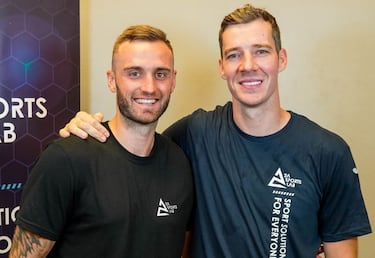
Yes, it was more or less like that, but we started working with Goran before we started working with the national team, in 2016. Then, in 2018, I became one of the team’s physical trainers. Then this summer was the first in which I’ve also worked with Luka Doncic as a professional trainer.
It was a challenging summer for him. After two really tough seasons in the NBA, with several games and the compressed calendar from the pandemic, immediately facing the Pre-Olympics and Tokyo Games…how did you and he deal with it?
It was crazy. You know how tough an NBA season is in itself for a player. And if we talk about Luka, it is even more complicated because he spends more time than the average on the court and the rivals are totally focused on him and his game. He arrived a week after the last game of the playoff series against the Clippers and we got to work immediately. We started with really light workloads. We wanted him to recover, but also for him to arrive in an optimal state to the key pre-Olympic match, the last one against Lithuania, which was crucial for us. And it ended up really well. Luka went out in that match and got Slovenia into the Games for the first time in history.
But in reality that was just the first step in the path…
Definitely. The next morning we realized there were the Olympic Games to prepare for. We all took a few days off and then started a new work cycle. We were already in Japan, so we stayed in Osaka a few days before settling into the Olympic Village. There, everything worked out wonderfully. We even had a great technical and medical team who knew how to connect all the pieces of the puzzle and prepare the team for the Games.
And right at the end, in the final fight for the medals, the team and Luka already seemed really tired, exhausted by that journey from the Pre-Olympic. A shame but also understandable.
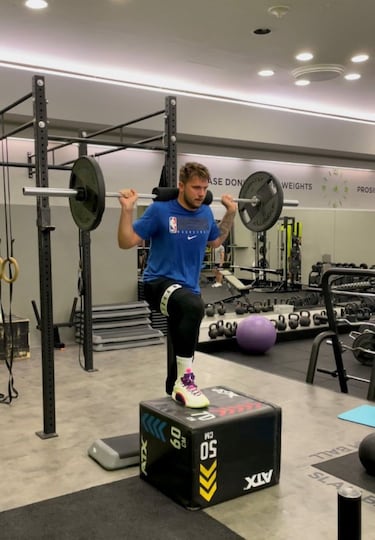
We were exhausted, yes. No other team that reached the semifinals had played as many games as we had. We had started the preparation a month before. And we had several very tough, very physical matches: Argentina, Japan, Spain, Germany… But the exceptional chemistry that the group had kept us going. The semi-final came, and we lost by one point to France. There we had the final and the medal secured. After all that, we didn't have the strength to play a good game in the fight for bronze. We were emotionally drained.
And after that whole ordeal, you got together with Luka Doncic to prepare for the new season with the Dallas Mavericks. From what I have read, with six days of hard work a week.
Luka went on vacation, between ten and fourteen days. And after that, we started with a three-week work plan with our mind set on the Dallas Mavericks training camp. Yes, we worked six days a week in the gym. And the last two weeks, in the afternoons we also trained on the basketball court.
And how were those weeks of intense work? How do you get a player like Doncic in shape?
Due to the deadlines we were managing, there was no time to do anything special, so we had to go to the basics. He had to get in shape at the start of the training camp in Dallas. The first two weeks we put more emphasis on strength and endurance, with lots of agility exercises. In the last one we focus more on power, interval exercises and really high intensity. With Luka there is one basic thing, and it is no secret, that you have to know before you get going with him. And it is the competition. You have to turn training into a competition, every exercise. He always wants to win. If you can create that competitive atmosphere when he goes to train, you have won. He will squeeze it to the maximum and you will achieve the objectives that you had set for your preparation.
Between one thing and another, he has hardly had a vacation. Is it something that can affect him as he progresses throughout the season and he accumulates games and minutes on his legs?
Luka is still very young. His body recovers and regenerates faster. He is really excited about the start of the new season. He is a competitor, a fighter. I think if there are no other factors that increase the risk of injury, there is going to be nothing to worry about.
From a physical point of view, what is Luka Doncic like?
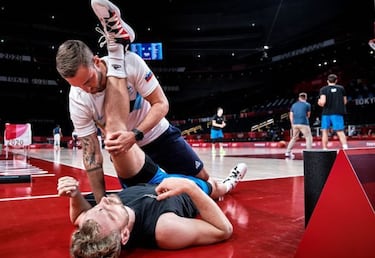
His strength is out of the box. He has really strong legs and his center of gravity is very low so when he gains his position it is very difficult to move him. He also has a lot of eccentric strength, allowing him and other players of his characteristics to slow down and break the pace of his defenders.
He is not the fastest or the most explosive, nor does he have a physical profile like that of other NBA superstars ...
Yes, exactly. And that's precisely why he breaks all the stereotypes that Americans have about how the ideal physique of a professional basketball player should be.
He is bigger than other players, and in fact sometimes his weight is debated by people. Is that legitimate?
It doesn't seem relevant to me. As long as he can play at the level that he does, no one can hold anything against him. The important thing is that he knows that things will be more difficult each season, each year that passes, that each time he will have to put more effort and attention in taking care of his body. That will be the way to have many successful seasons ahead.
You’ve worked with Goran Dragic when he was on the Miami Heat roster. The franchise of the so-called 'heat culture', a tradition of maximum physical demand, taking care of all the details, maximizing the players ... What was it like working with them? Are they as meticulous as they say?
Yes that's how it is. For me it has been fortunate to have lived and been part of that heat culture, that culture of work that they have in the franchise. They are very nice, very open, you can work really well with them. I always felt very well-received and made good friends. And I learned a lot. They also came to Slovenia when Goran Dragic was here working with me to take a look. The three concepts that define the Miami Heat are discipline, culture and hard work. The players put in extraordinary effort, they spend a lot of time taking care of their physical condition, training in the gym. Every Monday they are all weighed and they measure their percentage of body fat. Each player has their own personalized objectives and from there, there are many more rules and regulations. Lots (laughs). So yeah, that Miami Heat CULTURE is very real.
Is the NBA franchise’s method of working still really different compared to European teams?
Now most European clubs follow systems similar to those of the NBA. You can easily compare the best teams here with those there in that sense. We do not have less knowledge than they do. Sometimes in fact we have more. But there are still some differences. The main one is that they have a lot more staff in charge of taking care of the players: more coaches, physical therapists, doctors, nutritionists, cooks… They have the best possible means and are always waiting to improve in everything.
Related stories
What is the reason that Slovenia, a country of 2.1 million people, produces such an amount of talent on the basketball courts?
It's not just basketball anymore. We have a golden generation of athletes. In many disciplines: cycling, climbing, volleyball, skiing ... Slovenia is a very small country but with a lot of diversity. I think the key is our culture. We are a hard-working people, who do not give up under any circumstances, for which there is no greater motivation than to show ourselves what we are capable of. We are competitive, we always want to win and we grow with the sport around us. Our schools have very good support programs for teams, sports disciplines, organizations, federations… they all go hand in hand here.
